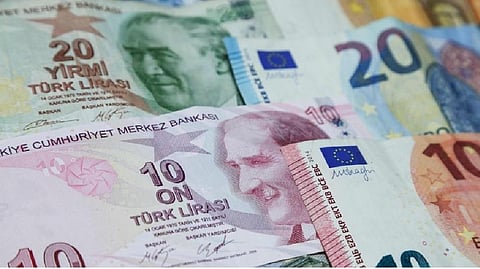

INSTANBUL: Currencies in emerging markets slipped on Tuesday, with the Russian rouble hitting a one-month low, while Turkey's lira was flat after its drop to a record low in the previous session as a deadly earthquake hit Turkey and northwest Syria.
The Turkish lira was subdued at 18.83 against the dollar by 0920 GMT, with the major earthquake adding to pressures from a strong dollar and the war in Ukraine, as well as a surprise inflation reading.
"In the past 4-5 months, the move (in lira) continues to be in the direction of a weaker currency and the main reason is that the underlying fundamental picture of the country features a number of very clear macro financial imbalances that cannot be kept under control forever," said Cristian Maggio, head of portfolio and ESG strategy at TD Securities.
Stocks in Turkey slid as much as 5%, before Borsa Istanbul said a market-wide circuit breaker was triggered and trading is halted temporarily in equity markets.
In Russia, the rouble hit a near one-month low bypassing 71 against the dollar as the Finance Ministry almost tripled its daily foreign currency sales, compensating for lower oil and gas revenue.
Data on Monday showed slumping energy revenues and soaring expenditure pushed Russia's federal budget to a deficit of 1.76 trillion roubles ($24.78 billion) in January.
"The rouble now is realigning slowly towards what is a longer term fundamental value, as you would expect from a heavily managed currency and a currency that is at the same time highly constrained by all the international sanctions and market restrictions," added Maggio.
South Africa's rand was also flat against the dollar ahead of an ahead of an address by President Cyril Ramaphosa. In central and eastern Europe, Hungary's industrial output rose by an annual 2.0% in December based on preliminary unadjusted data, above analyst forecasts for a 0.5% decline, the Central Statistics Office (KSH) said, boosting the forint up 0.3% against the euro.
Investors were awaiting a Polish and Romanian rate meeting later this week, with both central banks expected to keep their policy rates on hold at a respective 6.75% and 7.0%.
A key question for the region's policymakers now is to what extent domestic demand will be hit in 2023 with inflation still running high. So far, they've opted to pause sharp rate-hiking cycles launched in 2021, fearful of depressing GDP further.
The MSCI's index for stocks snapped its two-day losing streak, up 0.2%, supported by Chinese shares which eked out slim gains amid hopes for a de-escalation in Sino-U.S. tensions.
South Korea unveiled details of a long-touted plan to expand its currency spot and swap markets to offshore players as it strives to make its stock and bond markets more attractive to global investors.
Visit news.dtnext.in to explore our interactive epaper!
Download the DT Next app for more exciting features!
Click here for iOS
Click here for Android